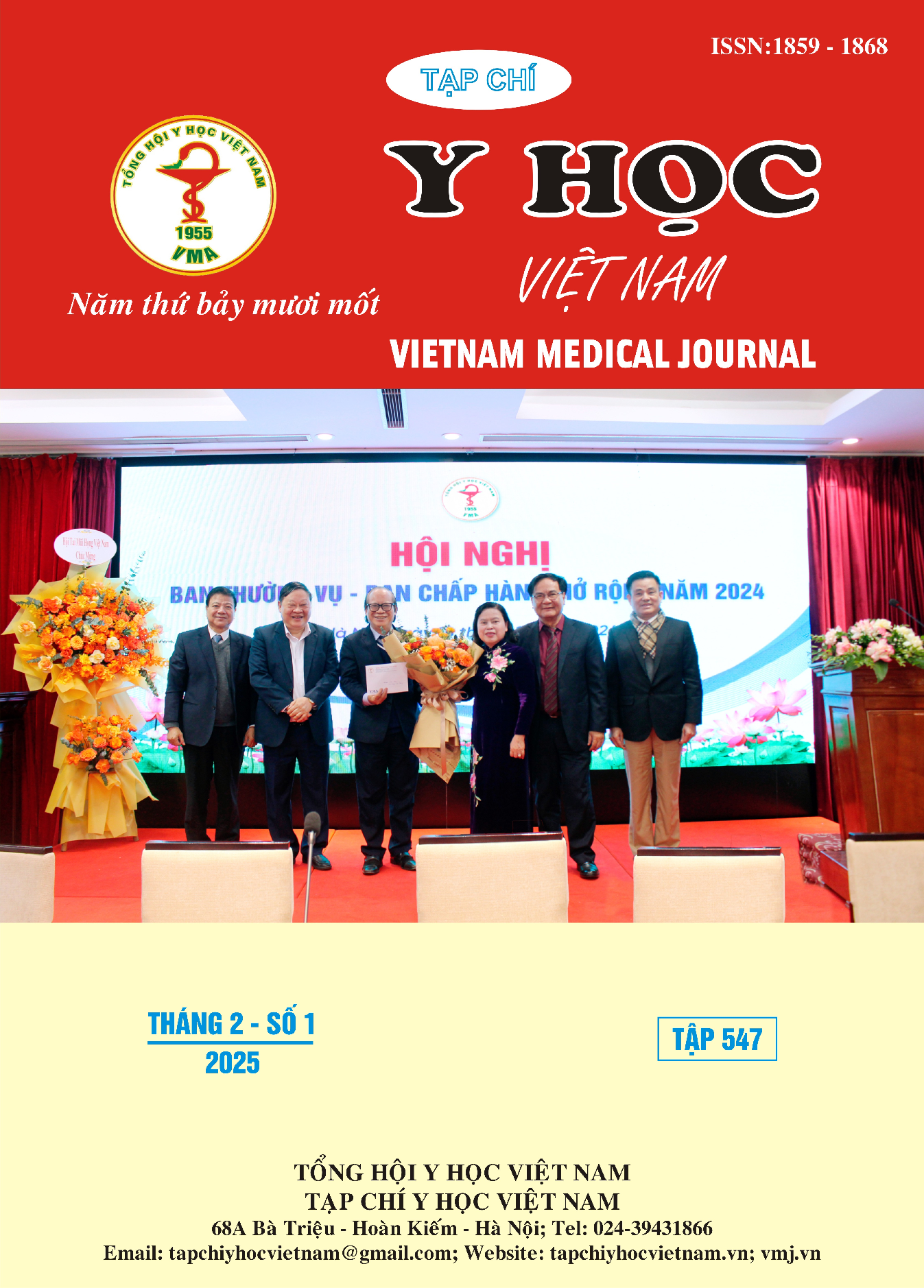FACTORS ASSOCIATED WITH DOSE REDUCTION OF BIOLOGICAL DRUGS IN THE TREATMENT OF RHEUMATOID ARTHRITIS AT CENTRE FOR RHEUMATOLOGY, BACH MAI HOSPITAL
Main Article Content
Abstract
Objective: The study aims to evaluate factors associated with dose reduction of biological drugs in the treatment of rheumatoid arthritis (RA). Subjects and Methods: This retrospective and prospective longitudinal observational study was conducted on 64 patients diagnosed with RA according to the ACR 1987 or ACR/EULAR 2010 criteria. These patients were treated with biological disease-modifying antirheumatic drugs (bDMARDs), including infliximab, adalimumab, subcutaneous golimumab, and tocilizumab, at the Center for Rheumatology of Bach Mai Hospital from January 2017 to June 2024. Results: The rate of dose reduction in the study group was 76.6%, with reasons for reduction including therapeutic response (61.2%), adverse effects (53.1%), drug unavailability (44.9%), and COVID-19 (10.2%). All patients underwent dose reduction by extending the interval between doses. The number of conventional synthetic DMARDs (csDMARDs) used in the dose-reduction group was significantly higher than in the standard-dose group (1.7 vs. 1.2, p = 0.03). Patients who reduced doses earlier than recommended had a lower average age than those who followed the recommended dose reduction, with a statistically significant difference (42.9 vs. 56.8 years old, p = 0.01). The highest adherence to recommended dose reduction was observed with golimumab and tocilizumab (84.6% and 83.3%, respectively). Conclusion: Therapeutic response was the main reason for the dose reduction of biological drugs. All patients in the study reduced their doses by extending the interval between treatments. The number of csDMARDs used was factor influencing the likelihood of dose reduction, while patient age at the time of biological treatment initiation was associated with adherence to recommended dose reduction.
Article Details
Keywords
rheumatoid arthritis, biological DMARDs, dose reduction, disease flare, Bach Mai Hospital.
References
2. Fraenkel L, Bathon JM, England BR et al. 2021 American College of Rheumatology Guideline for the Treatment of Rheumatoid Arthritis. Arthritis Care Res (Hoboken) 2021; 73(7):924-939.
3. Smolen JS, Landewe RBM, Bergstra SA et al. EULAR recommendations for the management of rheumatoid arthritis with synthetic and biological disease-modifying antirheumatic drugs: 2022 update. Ann Rheum Dis 2023; 82(1):3-18.
4. Dierckx S, Sokolova T, Lauwerys BR et al. Tapering of biological antirheumatic drugs in rheumatoid arthritis patients is achievable and cost-effective in daily clinical practice: data from the Brussels UCLouvain RA Cohort. Arthritis Res Ther 2020; 22(1):96.
5. Brahe CH, Krabbe S, Ostergaard M et al. Dose tapering and discontinuation of biological therapy in rheumatoid arthritis patients in routine care - 2-year outcomes and predictors. Rheumatology (Oxford) 2019; 58(1):110-119.
6. Loh MY, Jones CJ, Peall A, Trickey J. E075 Predictive factors for successful biologic disease-modifying anti-rheumatic drugs dose tapering in rheumatoid arthritis. Rheumatology 2023; 62(Supplement_2).
7. Verhoef LM, Tweehuysen L, Hulscher ME, Fautrel B, den Broeder AA. bDMARD Dose Reduction in Rheumatoid Arthritis: A Narrative Review with Systematic Literature Search. Rheumatol Ther 2017; 4(1):1-24.
8. Yip RML, Yim CW. Role of Interleukin 6 Inhibitors in the Management of Rheumatoid Arthritis. J Clin Rheumatol 2021; 27(8):e516-e524.


